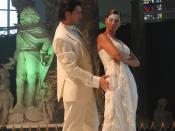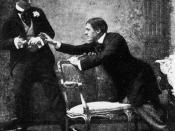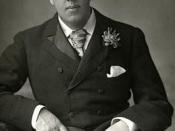The concept of marriage up until the twentieth century was considered to be prestigious and was the central aim of the English novel. Wilde uses the concept of marriage in The Importance of Being Earnest as a paradox. The characters are disinterested, some repulsed, by the concept of marriage yet it is the final goal and motivation of the play. The concept of marriage is presented in many ways. Each character presents their opinion on marriage, and has had an experience with it. The characters call marriage by a number of names and present it to be a "demoralizing," state. It is portrayed to end in problems and unhappiness yet unknowingly the characters all move towards this goal. Wilde, who had been married himself, uses this play to show the two class systems that are developed from marriage. Like the upper class and lower class there is the married and unmarried.
Algernon's first discussion with Lane about marriage presents it to be an awful state. Lane expresses his own experience with marriage and refers to it as a "misunderstanding." This begins the play, and provides and an image of the miserable state of marriage. Algernon's second conversation about marriage favors divorce. Algy's opinion on relationships and more specifically marriage show that he believes it to be "very romantic to be in love," and that "divorces are made in heaven," but he speaks with great distaste for marriage suggesting that there is "nothing romantic about a definite proposal." Through the play Algy's opinion is reformed upon his meeting of Cecily. Algernon proposes upon this first meeting. His presentation of this institution is inconsistent. I believe that Wilde uses the irregularity in Algy's opinion is to represent the unneeded emphasis on marriage, and more importantly on the bizarre reasons for marriage.


